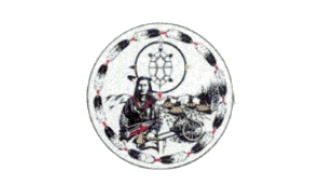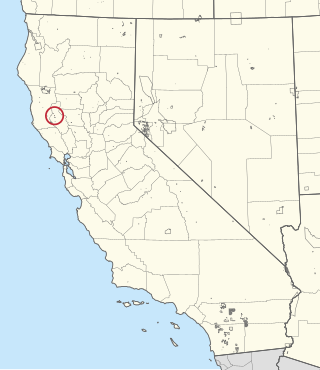Related Research Articles

Native American gaming comprises casinos, bingo halls, slots halls and other gambling operations on Indian reservations or other tribal lands in the United States. Because these areas have tribal sovereignty, states have limited ability to forbid gambling there, as codified by the Indian Gaming Regulatory Act of 1988. As of 2011, there were 460 gambling operations run by 240 tribes, with a total annual revenue of $27 billion.
The Chippewa Cree Tribe is a federally recognized tribe on the Rocky Boy Reservation in Montana who are descendants of Cree who migrated south from Canada and Chippewa (Ojibwe) who moved west from the Turtle Mountains in North Dakota in the late nineteenth century. The two different peoples spoke related but distinct Algonquian languages.

Tribal sovereignty in the United States is the concept of the inherent authority of Indigenous tribes to govern themselves within the borders of the United States.

A payday loan is a short-term unsecured loan, often characterized by high interest rates.

The Lac du Flambeau Band of Lake Superior Chippewa is a federally recognized Ojibwa Native American tribe. It had 3,415 enrolled members as of 2010. The Lac du Flambeau Indian Reservation lies mostly in the Town of Lac du Flambeau in south-western Vilas County, and in the Town of Sherman in south-eastern Iron County in the U.S. state of Wisconsin. It has a land area of 107.1 square miles (277.4 km2) and a 2020 census resident population of 3,518. Its major settlement is the unincorporated Lac du Flambeau, which had a population of 1,845.

Rocky Boy's Indian Reservation is one of seven Native American reservations in the U.S. state of Montana. Established by an act of Congress on September 7, 1916, it was named after Ahsiniiwin, the chief of the Chippewa band, who had died a few months earlier. It was established for landless Chippewa (Ojibwe) Indians in the American West, but within a short period of time many Cree (Nēhiyaw) and Métis were also settled there. Today the Cree outnumber the Chippewa on the reservation. The Bureau of Indian Affairs (BIA) recognizes it as the Chippewa Cree Reservation.

The Turtle Mountain Band of Chippewa Indians is a federally recognized Native American tribe of Ojibwe based on the Turtle Mountain Indian Reservation in Belcourt, North Dakota. The tribe has 30,000 enrolled members. A population of 5,815 reside on the main reservation and another 2,516 reside on off-reservation trust land.

The Indian Gaming Regulatory Act is a 1988 United States federal law that establishes the jurisdictional framework that governs Indian gaming. There was no federal gaming structure before this act. The stated purposes of the act include providing a legislative basis for the operation/regulation of Indian gaming, protecting gaming as a means of generating revenue for the tribes, encouraging economic development of these tribes, and protecting the enterprises from negative influences. The law established the National Indian Gaming Commission and gave it a regulatory mandate. The law also delegated new authority to the U.S. Department of the Interior and created new federal offenses, giving the U.S. Department of Justice authority to prosecute them.

The Otoe–Missouria Tribe of Indians is a federally recognized tribe, located in Oklahoma. The tribe is made up of Otoe and Missouria peoples. Their language, the Chiwere language, is part of the Siouan language family.

Lac Vieux Desert Band of Lake Superior Chippewa is a band of the Lake Superior Chippewa, many of whom reside on the Lac Vieux Desert Indian Reservation, located near Watersmeet, Michigan. It is approximately 45 miles southeast of Ironwood, Michigan in Gogebic County.
Tribal-state compacts are agreements between two sovereigns to agree on legal principles. Tribal-state compacts may be implemented in health care, child welfare, or other government functions. Tribal-state compacts are declared necessary for any Class III gaming on Indian reservations under the Indian Gaming Regulatory Act of 1988 (IGRA). They were designed to allow tribal and state governments to come to a "business" agreement. A compact can be thought of as "negotiated agreement between two political entities that resolves questions of overlapping jurisdictional responsibilities Compacts affect the delicate power balance between states, federal, and tribal governments. It is these forms that have been a major source of controversy surrounding Indian gaming. Thus, it is understandable that the IGRA provides very detailed instructions for how states and tribes can make compacts cooperatively and also details the instructions for how the federal government can regulate such agreements.
The Harvard Project on American Indian Economic Development, also known as the Harvard Project, was founded in 1987 at Harvard Kennedy School at Harvard University. It administers tribal awards programs as well as provides support for students and conducting research. The Harvard Project aims to understand and foster the conditions under which sustained, self-determined social and economic development is achieved among American Indian nations through applied research and service.

The Habematolel Pomo of Upper Lake is a federally recognized tribe of Pomo Indians in Lake County, California. The tribe's reservation, the Upper Lake Rancheria, is 119 acres (0.48 km2) large and located near the town of Upper Lake in northwestern California.
Santa Clara Pueblo v. Martinez, 436 U.S. 49 (1978), was a landmark case in the area of federal Indian law involving issues of great importance to the meaning of tribal sovereignty in the contemporary United States. The Supreme Court sustained a law passed by the governing body of the Santa Clara Pueblo that explicitly discriminated on the basis of sex. In so doing, the Court advanced a theory of tribal sovereignty that weighed the interests of tribes sufficient to justify a law that, had it been passed by a state legislature or Congress, would have almost certainly been struck down as a violation of equal protection.

Scott Tucker is an American convicted racketeer, loan shark, fraudster, and money launderer who used his illegal funds to finance – and drive for – his own sports car endurance racing team.
C & L Enterprises, Inc. v. Citizen Band, Potawatomi Indian Tribe of Oklahoma, 532 U.S. 411 (2001), was a United States Supreme Court case in which the Court held that the tribe waived its sovereign immunity when it agreed to a contract containing an arbitration agreement.
Kiowa Tribe v. Manufacturing Technologies, 523 U.S. 751 (1998), was a case in which the Supreme Court of the United States held that an Indian Nation were entitled to sovereign immunity from contract lawsuits, whether made on or off reservation, or involving governmental or commercial activities.

A payday loan is a small, short-term unsecured loan, "regardless of whether repayment of loans is linked to a borrower's payday." The loans are also sometimes referred to as "cash advances," though that term can also refer to cash provided against a prearranged line of credit such as a credit card. Payday advance loans rely on the consumer having previous payroll and employment records. Legislation regarding payday loans varies widely between different countries and, within the United States, between different states.
Plain Green Loans is an online installment loan company providing emergency cash via the internet. It is a Tribal Lending Enterprise owned by the Chippewa Cree Tribe on the Rocky Boy Indian Reservation. Plain Green Loans (PGL) is an online resource for the short-term financial needs of underbanked and subprime consumers. By offering bi-weekly and monthly installment loans, Plain Green helps consumers meet their emergency, cash-flow needs quickly and online. Plain Green markets, underwrites and services its portfolio.
Operation Choke Point was an initiative of the United States Department of Justice beginning in 2013 which investigated banks in the United States and the business they did with firearm dealers, payday lenders, and other companies that, while operating legally, were said to be at a high risk for fraud and money laundering.
References
- ↑ "A Fight Between Native American Lenders And The Government Could Reach The Supreme Court". BuzzFeed . 24 April 2017.
- ↑ "CFPB's Mulvaney shows lighter touch with tribal lenders". 16 March 2018.
- ↑ Clarkson, Gavin; Spilde, Katherine A.; Claw, Carma (1 March 2016). "Online Sovereignty: The Law and Economics of Tribal Electronic Commerce". SSRN 2740181.
- ↑ Javers, Eamon (17 September 2012). "How Some Payday Lenders Charge Over 700% on Loans". CNBC .
- ↑ "Statement by Barry Brandon, Executive Director, NAFSA - Native American Financial Services Association". nativefinance.org.
- ↑ "31 Members of Congress Blast Fed's Crackdown on Online Lending - Indian Country Media Network". indiancountrymedianetwork.com.
- ↑ "Court blocks Colorado AG from investigating tribes' online payday loans". 17 February 2012.
- ↑ "Respect Indian Country, Retire 'Rent-a-Tribe'". 28 August 2018.
- ↑ Note, Recent Case: Third Circuit Rules that Tribal Payday Lenders Cannot Compel Arbitration , 134 Harv. L. Rev. 2582 (2021).
- ↑ Williams v. Medley Opportunity Fund II, LP, 965F.3d229 (3d Cir.2020).
- ↑ Westney, Andrew (April 8, 2021). "Tribal Lending Deal With Larger $182M Payout Gets Initial OK". Law360.
- ↑ Goldberg, Ryan (May 31, 2021). "How a Payday Lender Partnered With a Native Tribe to Bypass Lending Laws and Get Rich Quick". The Intercept.